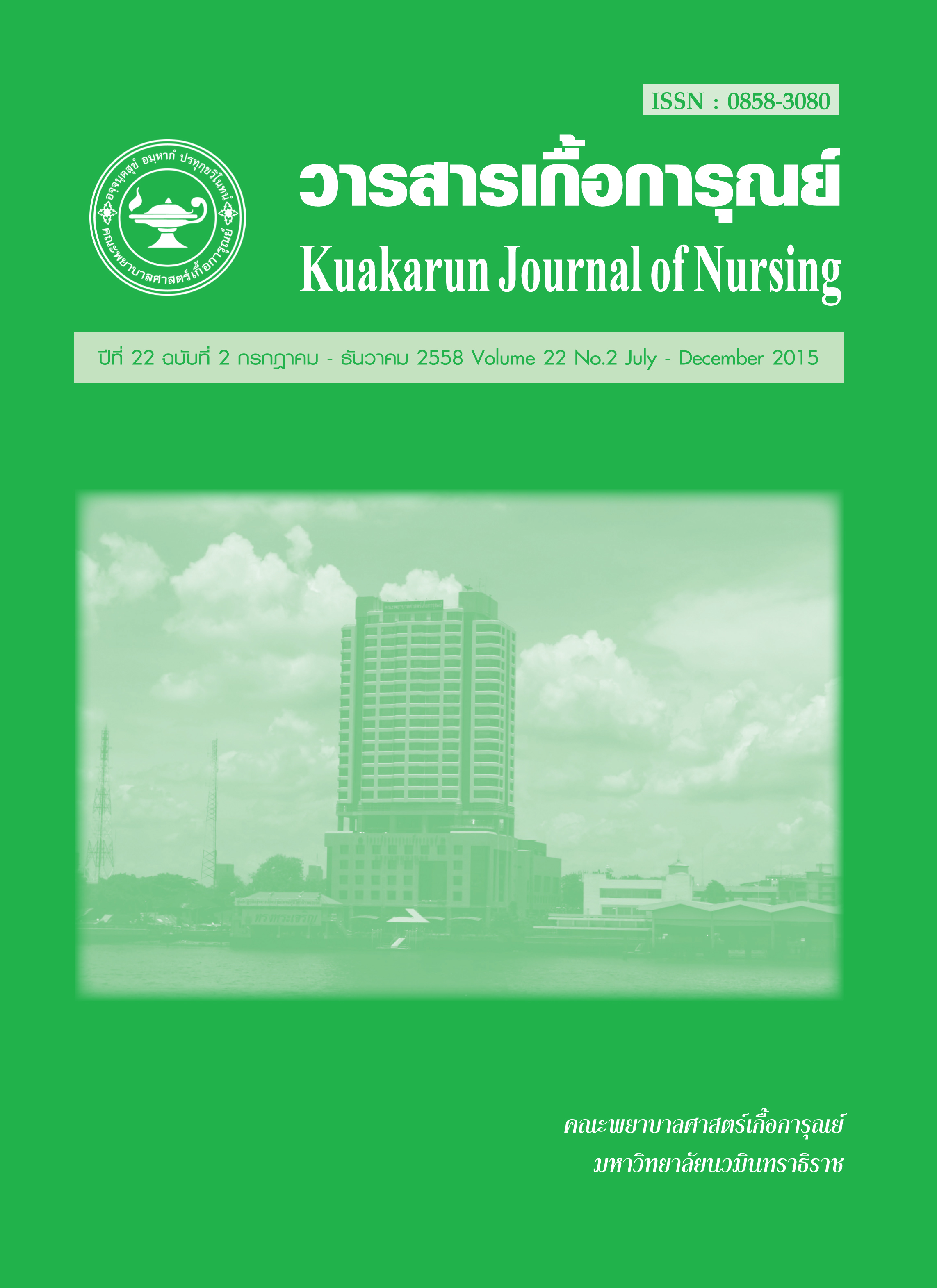ความสัมพันธ์ระหว่างการสนับสนุนทางสังคม การจัดการตนเอง การเผชิญปัญหา ความร่วมมือในการใช้ยา กับภาวะซึมเศร้าใน ผู้ป่วยเบาหวานชนิดที่ 2* Relationships among Social Support, Self–Management, Coping, Medication Adherence, and Depression in Adult Patients with T
คำสำคัญ:
ภาวะซึมเศร้า, การสนับสนุนทางสังคม การจัดการตนเอง, การเผชิญปัญหา, ความร่วมมือในการใช้ยา, ผู้ป่วยเบาหวานชนิดที่ 2บทคัดย่อ
การศึกษาครั้งนี้มีวัตถุประสงค์เพื่อศึกษาความสัมพันธ์ระหว่างการสนับสนุนทางสังคม การจัดการตนเอง การเผชิญปัญหา ความร่วมมือในการใช้ยา กับภาวะซึมเศร้าในผู้ป่วยเบาหวานชนิดที่ 2 ในเขตภาคตะวันออกเฉียงเหนือตอนล่าง กลุ่มตัวอย่างคือ ผู้ป่วยเบาหวานชนิดที่ 2 ที่เข้ารับการรักษาในคลินิกผู้ป่วยนอกโรงพยาบาลจากภาคตะวันออกเฉียงเหนือตอนล่าง จำนวน 150 คน เครื่องมือที่ใช้ในการวิจัย คือ แบบสอบถามข้อมูลส่วนบุคคล แบบประเมินการสนับสนุนทางสังคม แบบประเมินการจัดการตนเอง แบบประเมินการเผชิญปัญหา แบบประเมินความร่วมมือในการใช้ยา และแบบประเมินภาวะซึมเศร้า ที่ผ่านการตรวจสอบความตรงตามเนื้อหาโดยผู้ทรงคุณวุฒิและคำนวณค่าความเที่ยงเท่ากับ .93, .74, .92, .60 และ .81 ตามลำดับ วิเคราะห์ข้อมูลโดยการหาค่าเฉลี่ย ส่วนเบี่ยงเบนมาตรฐาน ค่าสัมประสิทธิ์สหสัมพันธ์พอยน์ไบซีเรียลผลการวิจัยพบว่าผู้ป่วยเบาหวานที่มีภาวะซึมเศร้าร้อยละ 48.7 (X =22.97, SD=5.37) ส่วนการสนับสนุนทางสังคม การจัดการตนเอง การเผชิญปัญหา ความร่วมมือในการใช้ยามีความสัมพันธ์ทางลบกับภาวะซึมเศร้าอย่างมีนัยสำคัญทางสถิติที่ระดับ .05 (r=-.477, -.275 , -.344 และ -.196 ตามลำดับ) จากผลการวิจัยครั้งนี้ควรเน้นให้พยาบาลมีการประเมินภาวะซึมเศร้าใน ผู้ป่วยเบาหวานและมีการพัฒนาโปรแกรมต่างๆที่เน้นการจัดการกับปัจจัยที่เกี่ยวข้องเพื่อป้องกันภาวะซึมเศร้าต่อไป
Relationships among Social Support, Self–Management, Coping, Medication Adherence, and Depression in Adult Patients with Type 2 Diabetes
The purpose of this research was to investigate relationships among social
support, self-management, coping, medication adherence, and depression in
adult patients with type 2 diabetes in the lower northeastern region of Thailand.
The subjects were 150 persons with type 2 diabetes. They were select by a
purposive sampling. The instruments used for data collection were the
demographic questionnaire, the Enrich Social Support Questionnaire, the selfmanagement questionnaire, the Coping Strategies Inventory, the Morisky
Medication Adherence Scale, and the Center for Epidemiologic Studies-Depression Scale. The instruments were test for content validity by a panel of experts. The internal consistency reliability for each questionnaire .93,.74,.92,.60 and .81, respectively. Data were analyzed by using means, standard deviations, Point biserial correlation. The study findings revealed that 48.7% of patients with type 2 diabetes had depression with mean score that equal to 22.97 (SD = 5.37). There were negatively significant statistical correlation between social support, self-management, coping and medication adherence at the level of .05 (r=-.477,-.275, -.344 and -.196 respectively). Regarding the research findings, nurses should assess depression in diabetic patients, and develop the programs to prevent depression in the patients.

















